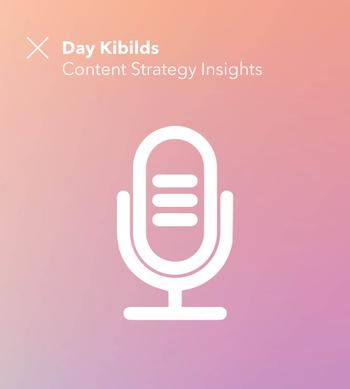Content Strategy: Cognitive Load and Emotional Labor
7/28/2022
Day is strategy director at Ologie, focusing primarily on enrollment marketing strategy for educational organizations. In her 12 years in the higher education sector, she’s led enrollment and digital innovation work at Penn State, Cornell, Western University (Canada), and supported university content strategy projects at Pickle Jar Communications. She speaks regularly about enrollment marketing, productivity, and stakeholder management at global conferences such as CASE, HighEdWeb, Confab, PSE Web, Utterly Content, and ContentEd.
As a lifelong immigrant who has lived in 6 different countries, equity and diversity are really important to her. She sees content as a true equalizer, and part of her motivation to do this work is so students of all backgrounds have access to the educational institutions they deserve to be a part of.
Day joined David Dylan Thomas and Larry Swanson on the Content Strategy Insights podcast to discuss two of the common failings content strategists and designers encounter. Though the goal is to create experiences that inform and empower users, sometimes we end up bombarding them with excessive cognitive load and imposing on them unnecessary emotional labor.
They discussed:
- how emotional labor and cognitive load can put up a brick wall between you and your users
- Day’s personal story about her college admissions experience and how it informs her work
- the implications of higher ed institutions being slow to adopt content strategy practices
- the disconnect between the language on admissions webpages and student reading ability and how simply paying more attention to language could help
- the dynamics behind emotional labor and how we might assign value to it
- how power dynamics in a relationship can make it difficult to push back when someone is assigned extra emotional labor
- the inverse correlation between wealth and privilege in the assignment of emotional labor
- a new metric in college admissions that looks at improvement of metrics besides academic achievement – things like grit and perseverance and commitment
- the importance of defining goals and purpose and articulating new incentives when you introduce new metrics
- how surprisingly easy it is it to make things easier for your colleagues and customers



